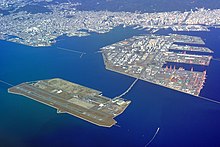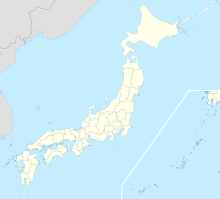Kobe Airport
You can help expand this article with text translated from the corresponding article in Japanese. Click [show] for important translation instructions.
|
Kobe Airport 神戸空港 Kōbe Kūkō | |||||||||||
|---|---|---|---|---|---|---|---|---|---|---|---|
 | |||||||||||
 | |||||||||||
| Summary | |||||||||||
| Airport type | Public | ||||||||||
| Owner/Operator | Kansai Airports (Orix-Vinci SA consortium) | ||||||||||
| Serves | Keihanshin | ||||||||||
| Location | Chuo-ku, Kobe | ||||||||||
| Opened | February 16, 2006 | ||||||||||
| Operating base for | |||||||||||
| Elevation AMSL | 22 ft / 7 m | ||||||||||
| Coordinates | 34°37′58″N 135°13′26″E / 34.63278°N 135.22389°E | ||||||||||
| Website | www | ||||||||||
| Map | |||||||||||
 | |||||||||||
| Runways | |||||||||||
| |||||||||||
| Statistics (2021) | |||||||||||
| |||||||||||
Source: Japanese Ministry of Land, Infrastructure, Transport and Tourism[1] | |||||||||||
Kobe Airport (神戸空港, Kōbe Kūkō) (IATA: UKB, ICAO: RJBE) is a domestic airport on an artificial island just off the coast of Kobe, 8 km (5.0 mi) south of Sannomiya Station[2] Japan. Opened on February 16, 2006, it primarily handles domestic flights, but can also accommodate international charter flights. In the first year of operation (2006), the airport handled 2,697,000 passengers with an average load factor of 61.1%. In 2017, it handled 3,071,974 passengers with an average load factor of 79.4%.[3] In the fiscal year covering April 2022 - March 2023, UKB had a passenger throughput of 3,109,151. The island airport covers just 156 hectares (385 acres) of land.[4]
History
[edit]The city government of Kobe first proposed an airport adjacent to Port Island in 1971. At the time, government planners were seeking alternatives to the heavily congested Itami Airport: the original Kobe Airport plan called for six runways more than 3,000 m (9,843 ft) in length on a 1,100 ha (2,700 acres) facility. The mayor of Kobe, Tatsuo Miyazaki, declared his opposition to building such a large airport so close to the city, and was re-elected shortly afterward in 1973, defeating a competitor who supported the airport.[5]
Kobe businesses were still interested in the plan, however, and pressed the city government to propose a smaller facility with one 3,000 m (9,843 ft) runway. This plan was submitted to the Transport Ministry in 1982 as a competitor for the Kansai International Airport plan which was then being supported by the Osaka and Wakayama prefectural governments. After the national government voiced its displeasure with the Kobe proposal, Kobe officially switched its support to the Kansai Airport proposal in 1984, but in 1985 decided to independently fund the construction of another airport.[5]

The construction of the airport was stalled for lack of funding until 1995, when it won national government support as a means for recovering the Kobe economy in the wake of the Great Hanshin earthquake. Despite ongoing controversy, locals continued to support the plan: in the 1997 mayoral election, the pro-airport coalition won a narrow victory over the anti-airport coalition. Construction began in September 1999 but political controversy continued: 87,000 signatures were collected in a petition to recall the mayor in 2000, and a citizen lawsuit to cancel the project was dismissed in 2004.
The airport finally opened on February 16, 2006, with Japan Airlines operating the first flight and All Nippon Airways operating the first scheduled flight. Both ANA and JAL announced plans to replace portions of their widebody fleet with a larger number of mid-size aircraft, in part because of a need to fill the excess number of flight slots created by Kobe Airport's construction.[6] The airport handled its first international business jet flight in September 2006.[7]
As part of its bankruptcy restructuring, JAL terminated all services out of Kobe and closed its office on June 1, 2010, in response to which Skymark Airlines announced a major expansion at the airport.[8] ANA also cut back services following the airport's opening. Skymark is currently the dominant carrier at Kobe carrying approximately two-thirds of its passengers.[9]
In 2013, Kobe mayor Tatsuo Yada endorsed a proposal to consolidate the management of the three Kansai region airports by adding Kobe Airport to the planned sale in 2014 of operating concessions at Itami and Kansai.[10]
Kobe was already the most indebted municipality in Japan with debts of over ¥3 trillion after the Great Hanshin earthquake, and this project's cost (estimated at over ¥300 billion, or US$3 billion) has made it very controversial. Supporters argue that the third airport can mean increased competition and lower airfares. People in the surrounding regions (Shikoku, Awaji Island etc.) can now have a closer airport while access to Kansai may be limited. Since the ferry from Tokushima to Kansai International Airport was discontinued, travellers have had to rely on alternate means of transportation including a bus to Kansai Airport, which takes an hour longer, or to use the local Tokushima Airport, which is limited in schedules.
On April 1, 2018, Kansai Airports Kobe founded by Orix, Vinci Airports, and Kansai Airports took over the operation of Kobe Airport.[11]
Airlines and destinations
[edit]
Kobe has a single passenger terminal with four gates capable of accommodating widebody aircraft
Some international charter flights also use Kobe Airport. Although the airport's runway is not long enough to handle long-range flights to Europe and the Americas, it occasionally handles charters to China and other nearby countries.
The Transport Ministry has capped scheduled domestic operations at 30 daily flights, and has banned international flights with the exception of private aircraft and "own use" charters, in order to prevent overcrowding in the area's airspace and to protect the growth of Kansai Airport.[5] The flight caps have been a point of controversy with Kobe Airport supporters, who point out that the cap was calculated based on Kansai Airport operating twice as many frequencies as are currently offered: given the current traffic levels at Kansai, Kobe should be able to handle six or seven flights per hour.
Statistics
[edit]Graphs are unavailable due to technical issues. There is more info on Phabricator and on MediaWiki.org. |
| Passengers | Change | Aircraft operations |
Load Factor | |
|---|---|---|---|---|
| 2005 (Opened in March) |
353,673 | 1,237 | 72.5% | |
| 2006 | 2,743,004 | 10,629 | 60.4% | |
| 2007 | 2,974,983 | 10,638 | 67.0% | |
| 2008 | 2,579,674 | 9,859 | 67.8% | |
| 2009 | 2,337,480 | 9,593 | 70.9% | |
| 2010 | 2,219,887 | 9,971 | 69.2% | |
| 2011 | 2,568,084 | 12,141 | 70.3% | |
| 2012 | 2,410,343 | 13,551 | 64.2% | |
| 2013 | 2,356,327 | 13,575 | 65.2% | |
| 2014 | 2,446,455 | 14,020 | 64.9% | |
| 2015 | 2,546,591 | 13,711 | 67.0% | |
| 2016 | 2,783,636 | 12,513 | 77.4% | |
| 2017 | 3,136,194 | 13,868 | 79.4% | |
| 2018 | 3,190,090 | 14,817 | 80.7% | |
| 2019 | 3,292,298 | 16,423 | 75.8% | |
| 2020 | 1,213,380 | 11,614 | 46.4% | |
| 2021 | 1,752,629 | 15,019 | 48.1% | |
| 2022 | 2,701,440 | 16,635 | ||
| 2023 | 3,434,858 | 17,454 |
Ground and water transportation
[edit]
On February 2, 2006, Kobe Airport Station was connected to Sannomiya Station in central Kobe by an extension of the existing Port Liner automated guideway transit system, using 2000 series trains as well as some older 8000 series trains (older trains being gradually replaced by newer 2000 ones). Travel time to Sannomiya is 18 minutes. From Sannomiya, it is 21 minutes to Ōsaka Station and 51 minutes to Kyoto Station by JR special rapid express.
Kobe Airport is connected to Kansai Airport by the Kobe–Kanku Bay Shuttle (神戸-関空ベイ・シャトル), a high speed ferry which completes the airport-to-airport journey in 31 minutes for ¥500 for visitors to Japan.
There are bus services to Shin-Kobe Station (on the San'yō Shinkansen), Sannomiya Station, and Kōbe Station in 25–38 minutes. A single trip to Shin-Kobe Station costs ¥330.
Accidents and incidents
[edit]- At 14:30 on 31 May 2024, a light aircraft belonging to Hirata Gakuen aviation school landed on the airport runway without its wheels being extended during a touch-and-go landing, forcing the affected runway's closure and the cancellation of 34 flights. None of the three people aboard the plane were injured.[17]
See also
[edit]References
[edit]- ^ "Kobe Airport" (PDF) (in Japanese). Japanese Ministry of Land, Infrastructure, Transport and Tourism. Archived from the original (PDF) on 23 May 2021. Retrieved 23 May 2021.
- ^ AIS Japan Archived 2016-05-17 at the Portuguese Web Archive
- ^ a b 神戸空港利用状況 [Kobe Airport usage]. City of Kobe (in Japanese). Retrieved 1 September 2018.
- ^ "Kobe Airport Facts and Statistics". kansai-airports.co.jp. Retrieved October 13, 2023.
- ^ a b c 関西3空港のあり方について(提言) (PDF). 財団法人 兵庫地域政策研究機構. March 2010. Archived from the original (PDF) on 29 September 2013. Retrieved 12 December 2013.
- ^ Shimizu, K. "JAL, ANA eye smaller jets to meet changing needs". in Japan Times Archived 2004-10-11 at the Wayback Machine, Oct 2004., retrieved February 15, 2007
- ^ "神戸市:神戸空港ホームページ 神戸空港の経緯". Archived from the original on 2014-01-04. Retrieved 2011-06-08.
- ^ 兵庫県と神戸市・神商、神戸空港24時間化など要望 国交省に. The Nikkei. 1 June 2010. Retrieved 12 December 2013.
- ^ "Archived copy" (PDF). Archived from the original (PDF) on 2018-04-01. Retrieved 2018-04-01.
{{cite web}}: CS1 maint: archived copy as title (link) - ^ 神戸市長、3空港一体に意欲. The Nikkei. 5 October 2013. Retrieved 12 December 2013.
- ^ "神戸空港特定運営事業等における新運営会社の設立および実施契約の締結について" (PDF). Kansai Airports. 2017-09-26.
- ^ "Fuji Dream Airlines adds Kobe – Aomori service from late-March 2020".
- ^ "Fuji Dream Airlines W19 new routes".
- ^ "News for Airlines, Airports and the Aviation Industry | CAPA".
- ^ Liu, Jim. "Skymark Airlines adds Shimojishima service from late-Oct 2020". Routesonline. Retrieved 19 August 2020.
- ^ 暦年・年度別空港管理状況調書 (in Japanese). Japanese Ministry of Land, Infrastructure, Transport and Tourism. Retrieved 30 December 2022.
- ^ "Kobe Airport closes runway after small plane makes belly-landing". NHK. 31 May 2024.
External links
[edit]- (in English) Japan Guide: Kobe Airport
- (in English) Kobe Airport Terminal
- (in Japanese) Kobe Airport Terminal
- (in Japanese) Kobe Airport Marine Air
- Kobe Airport Guide from Skymark Airlines
- Current weather for RJBE at NOAA/NWS
- Accident history for UKB at Aviation Safety Network



